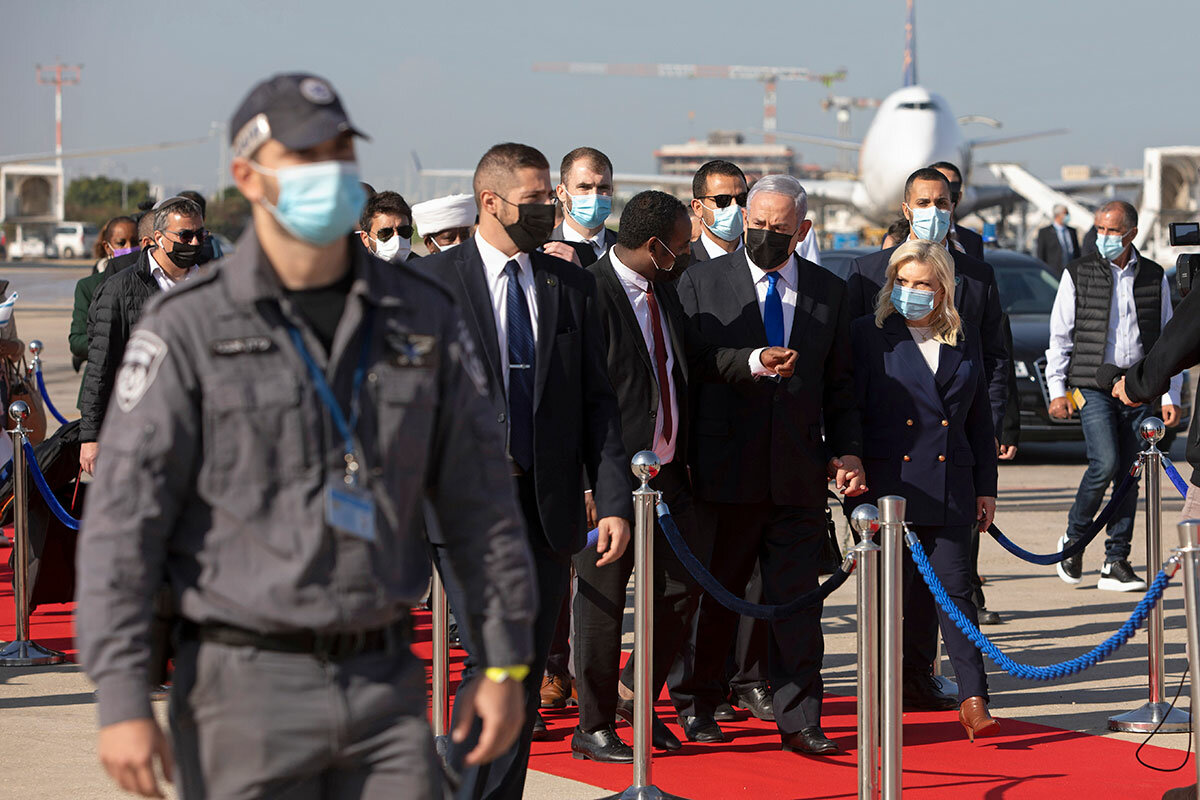Amid war, Ethiopian Jews await Israeli rescue. Is bias causing delay?
Loading...
| Tel Aviv, Israel
When hundreds of flag-waving Ethiopian immigrants descended from a passenger jet to kiss the tarmac in Israel this month, they were feted by Prime Minister Benjamin Netanyahu in a ceremony reminiscent of the celebrated airlift of tens of thousands of Ethiopian Jews at the end of the last century.
But for Surafel Alamo, a university student who immigrated to Israel from Ethiopia in 2006, it was a bittersweet moment. That’s because Mr. Alamo’s two sisters remain in Gondar – an Ethiopian city buffeted by the country’s civil war and the pandemic – waiting for word from Israel about when they will be able to emigrate as well.
His sisters belong to a group of approximately 8,000 impoverished Jews in Gondar and Addis Ababa who are short of food and medicine as they wait for Israel to fulfill a 2015 decision to bring the entirety of the community on aliyah – Hebrew for Jewish immigration to Israel.
Why We Wrote This
Amid both civil war and pandemic in Ethiopia, activists see the plight of Jews there as a humanitarian issue – and they say the Israeli government’s rescue efforts reflect a pattern of discrimination.
“The war is dangerous for them,” says Mr. Alamo, a spokesman for the Struggle for the Aliyah of Ethiopian Jewry, describing soldiers in the streets and rocket attacks from the rebellious province of Tigray. “They are scared for their life. It’s too bad that Israel isn’t taking care of them. The people there are suffering. They lack the basics.”
Since the 2015 pledge, 2,250 Ethiopian Jews have been brought to Israel. In October, the government decided to bring another 2,000 by the end of the year – a decision pushed by Absorption Minister Pnina Tamano-Shata, Israel’s first Ethiopian Cabinet member.
Ethiopian activists lament the government’s comparatively slow pace on immigration and charge that it reflects a pattern of discrimination toward African Jews that also manifests itself in policing in Israel and the immigrants’ economic struggles here. They accuse Mr. Netanyahu, who promised to bring 7,500 immigrants to Israel before the country’s election last March, of using the issue to win the votes of the country’s 150,000 Ethiopian Jews. A new election may be looming in early 2021.
“If they were really interested in aliyah, they would do it over a couple of months. But they do it little by little before elections,” says Mr. Alamo. “If [war] had taken place amid Jewish communities in the U.S., France, or the former Soviet Union, the government would declare an emergency aliyah. But because this concerns Black Ethiopian Jews, the government doesn’t rush.”
A week before the Dec. 3 arrival of the planeload of Ethiopian Jews, about 200 protesters demonstrated outside Mr. Netanyahu’s office in Jerusalem. With pictures of relatives in Ethiopia, they chanted “wake up” and held signs reading, “Don’t stop aliyah because of color.”
Mr. Netanyahu’s office didn’t respond to a request for comment, but an Israeli official who asked not to be identified says “budget constraints” have forced the government to implement the 2015 decision in phases.
While the largest group of Ethiopian Jews, the Beta Israel, traces its history back to the fourth century, the community’s Jewishness was questioned by some Israelis in the country’s early years before being affirmed by the country’s chief rabbis in the early 1970s.
Israel carried out dramatic airlifts of Ethiopians in two waves between 1984 and 1991, including flying some 14,300 immigrants in less than two days in May 1991, known as Operation Solomon. Yet while the country simultaneously celebrated and neglected the new arrivals, the government struggled to come up with an approach to tens of thousands of Ethiopian Christians with Jewish lineage – known pejoratively as Falash Mura – who left the Jewish community over the centuries but were seeking to return.
Successive commissions in the 1990s sought to develop a policy. Since then, Ethiopian Jews arrived here gradually. The government twice declared the immigration over, only to relent.
“Almost 30 years ago, Israel Radio declared very dramatically, ‘The Ethiopian exile is over.’ People thought that this is the end of the story. Soon after that, there are other people there in Addis Ababa with questions about their status,” says Steven Kaplan, a sociology professor at Hebrew University who focuses on the Ethiopian Jewish community.
“There are questions: Is this a Jewish migration issue or a humanitarian issue? … What’s clear is that each time the government accepts this idea that ‘There’s a relatively small number, we’re going to bring that number, and it’s going to be over.’ And each time, it turns out that there are” thousands more.
Similarly, Israel’s 2015 decision came some two years after it declared Ethiopian Jewish immigration completed.
The piecemeal nature of the immigration has split numerous families, with those in Israel sending financial support back to relatives, some of whom, having left rural villages in hopes of emigrating, have waited for years in shacks of mud and corrugated metal in migrant quarters of Gondar and Addis Ababa.
Mr. Alamo says he sends sums of 2,000 shekels ($600) whenever possible. Since the outbreak of the pandemic, his sisters, who are in their 30s, are no longer able to earn money selling coffee to pedestrians. Now the war has made telephone conversations more unpredictable.
“The people there are suffering. It’s we who are helping them,” he says. “If families here don’t send money, they have nothing to eat.”
Activists and community members allege the Jewish Agency, a quasi-governmental organization promoting immigration, and other Jewish organizations have not sufficiently focused on the plight of the community nor devoted enough resources.
“There is a humanitarian crisis,” says Alisa Bodner, an American Israeli activist for Ethiopian Jewish immigration. “No other Jewish community in the world is facing a crisis like this. Yet the majority of the Jewish world has turned its back on the community, including the state of Israel.”
Jewish Agency Director-General Amira Ahronoviz says the organization has been ramping up its humanitarian aid operation in Ethiopia over the last two years and considers it “very effective.” The effort currently includes 15 staff members, daily food aid to children, the distribution of hygiene products, and medical care.
Immigration from Ethiopia is an important part of the agency’s mission, she says. At the same time, the scope of that mission depends on Israeli policy. “We serve based on the government decisions, and eligibility [for immigration] is defined by” the Interior Ministry, Ms. Ahronoviz says.
Ms. Tamano-Shata, who toured a Jewish neighborhood in Ethiopia before the recent airlift, in August began promoting a $300 million plan to implement the 2015 decision, hoping to bring 4,500 immigrants by the end of the year.
Her appointment as absorption minister was a milestone just months after Ethiopians in Israel went to the streets by the tens of thousands in the summer of 2019 to protest police violence toward Black youths. In addition, during the election campaign of early 2020, Prime Minister Netanyahu lured an Ethiopian politician in a rival party to come to the Likud and appointed him deputy public security minister.
Despite that, police profiling hasn’t eased much, says Avi Yalou, an Ethiopian Israeli community activist. Mr. Yalou describes Mr. Netanyahu’s overtures to the Ethiopian community as “cheap populism.”
“Every time they say, ‘Now we’ll bring another 1,000.’ What is this, trading on a financial market?” he says. “There are grandparents that haven’t seen their grandkids. This is something that is unacceptable.”








